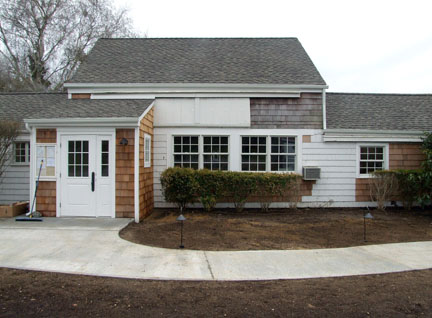
Before he became mayor last year for the second time in Sagaponack’s history as an incorporated village, Bill Tillotson attended a Board of Trustees meeting where the subject of automated driveway gates — and the various issues they present — came up. He flagged it as something that would be necessary to address someday.
The board did just that last week, holding its second public hearing on a proposed local law that would prohibit the installation of driveway entry gates throughout the village. The initial public hearing was held on April 12 and then left open to allow the public more time to weigh in.
At the second public hearing on May 10, there was overwhelming opposition to the proposed law, and Tillotson said earlier this week that it is unlikely that the current rules guiding the installation of driveway gates would change any time soon.
Tillotson said he and the board decided to propose the new legislation to “see where sentiment lies.”
Driveway gates had become a contentious issue for several reasons, he explained. “The [Architectural and Historic Review Board] seems to struggle with how they should look and how the whole community looks, and others didn’t like the thought that we’d be a gated community in the sense of having a ‘keep-you-out’ look to the properties,” he said. “But there were a whole lot of people who feel that the gates help in keeping their dogs and kids safe on their property.”
Tillotson said he’s also heard complaints from members of local volunteer ambulance and fire departments that the gates can sometimes be an obstacle when they’re trying to respond to a call.
The vast majority of residents who spoke at the hearing said they considered the driveway gates essential to maintaining safety, for their young children, dogs and personal property.
Southampton Attorney John Bennett spoke at the hearing, calling the proposed law “extreme and unnecessary,” and said that the issue of AHRB meetings being bogged down by driveway gate applications could perhaps be addressed by creating more clear guidance and regulations around handling those applications.
Margaret Wheeler Johnson, a mother of four who lives on Hedges Lane on a property she described as being close to the road, said the prospect of banning the gates “feels like a huge safety concern for our children.”
She was one of several people who cited the child fatality on Town Line Road last summer, when an 11-year-old boy was killed while riding his bike when he was struck by a work truck that was backing into a driveway.
Jason Mudrick, a property owner who has a home still under construction, said that cutting off the allowance for a driveway gate for those still in the construction process would feel unfair, and he pointed out that all the homes around his property have driveway gates, adding that they have become more of the rule rather than an exception, particularly in communities south of the highway on the East End.
Tillotson said he thinks the current law — which lists required setbacks and also does not allow for the installation of new driveway gates in the historic district — is “fine,” and said the requirement to have the gates set back from the street is key, in his mind.
“It helps alleviate that look of being a wall of hedges and gates,” he said. “I detest the hedge. If the gates are set back, we can live with that.”
The hearing was closed on May 10 and the board left a five-day written comment period, which was set to end on Wednesday, May 17. The board has 62 days to act on the local law after it’s closed, or else take no action.